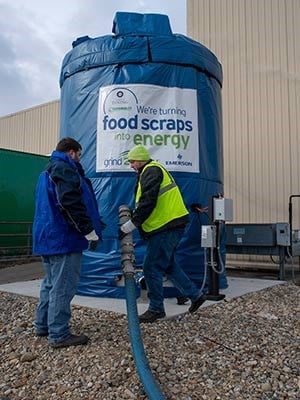
Notre Dame adopts anaerobic digestion in response to students’ concerns over food waste
2,000 pounds of non-consumable food waste diverted every day
Campuses across America produce over 20m tonnes of food waste a year
The University of Notre Dame in Indiana, America, is to divert the 2,000 pounds of non-consumable food waste it produces every day to a neighbouring farm’s anaerobic digester. The new system the institution has introduced is expected to reduce its overall waste by 10% a year across campus, which amounts to 700,000 pounds.
The recycling programme began after students called for an end to the waste and composting on campus. The question of whether that would work was put to chemical engineering student Matthew Magiera, who at the time was an intern at the Notre Dame Office of Sustainability.
Composting proved not to be viable. “We don’t have the raw material,” Mageira says. “We don’t use the product, and the labour and logistics cost would be pretty incredible.” Anaerobic digestion on the other hand was.
On the basis of Magiera’s findings, the University installed the first of three Grind2Energy systems – essentially an industrial scale garbage disposal unit consisting of a processing sink, grinder and 5,000-gallon outdoor holding tank – at the Center for Culinary Excellence (CCE), part of University Catering, in January. Two additional Grind2Energy systems will be installed in the dining halls in the near future.
Combined, the three systems will reduce non-consumable food waste from the dining halls and CCE by 99%, according to Allison Mihalich, senior program director in the Office of Sustainability. They will reduce overall waste across the campus by 10%, or 700,000 pounds a year, diverting it from landfill where it would combine with other trash to produce methane, a greenhouse gas 30 times more potent than carbon dioxide.
Campus Dining, which manages the campus catering facilities, previously partnered with LeanPath, a global food-waste service, to reduce pre-consumer food waste related to overproduction, spoilage, trimmings, overcooking or contamination by 30% across both dining halls and the CCE.
All the non-consumable food waste collected goes to Homestead Dairy, a state-of-the-art dairy farm spread across multiple facilities in Plymouth, about 30 miles away from Notre Dame in Marshall County. The waste counts as a donation to the farm, although it saves the University money in the form of lower charges for disposing of the garbage.
Homestead already converts cow manure from a herd of about 3,500 cows and “co-feeds” — calf bedding, day-old feed, fats, oils, grease, organics, food waste — into electricity at its facilities in a series of three digesters, each with a capacity of 950,000 gallons, delivering enough energy to power 1,000 homes.
Food waste is an increasing problem nationwide. Currently, about 40% of the food in the US is lost or wasted annually, according to the Natural Resources Defense Council, contributing to greenhouse gas emissions, deforestation and depletion of freshwater resources. College campuses produce an estimated 22 million pounds of food waste annually through their dining operations alone, according to the Food Recovery Network.


